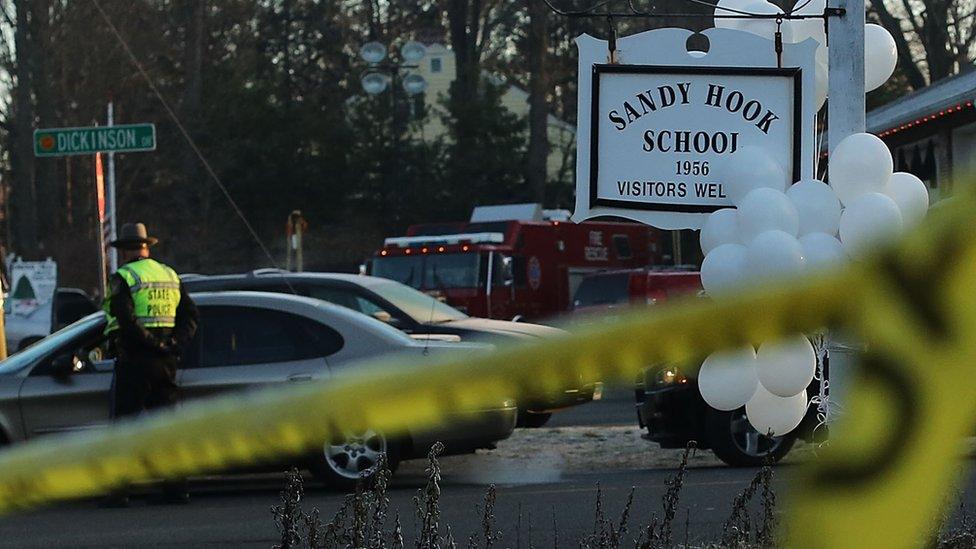Alex Jones and InfoWars: How Sandy Hook families fought back
- Published
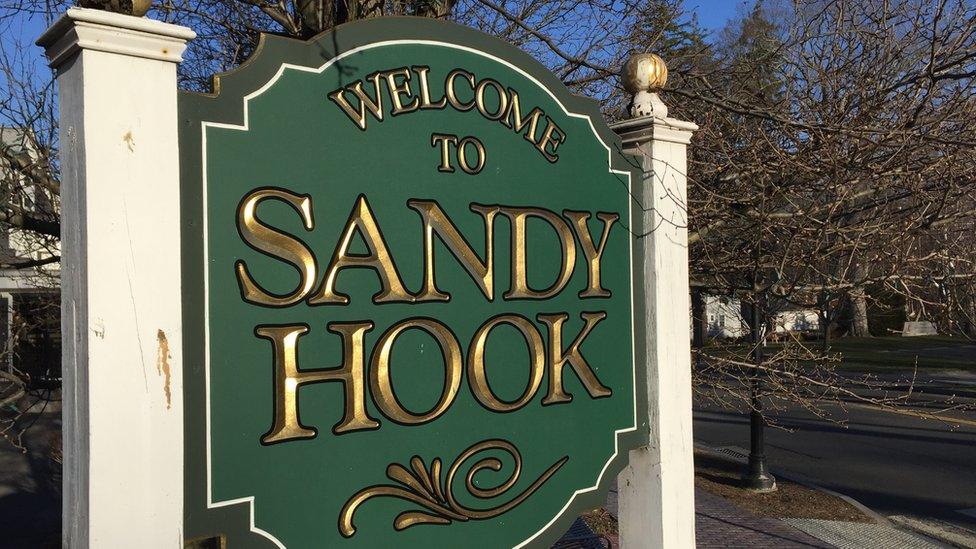
It was one of the worst school shootings in American history, but some people insist that the Sandy Hook massacre never happened. They post YouTube videos and spread rumours online, and their false theories have been repeated by a media mogul conspiracy theorist who has been linked to Donald Trump. Now, after years of harassment, the families of the victims are fighting back online.
Leonard Pozner clicks on a YouTube video showing his street and the outside of his home. The camera zooms in on his balcony, and his address and a route to his door flash up on the screen.
There's no narration on the video - but there doesn't need to be. The message is clear: "We know where you live."
Because of videos like this one - there are dozens on YouTube, and more appear ever day - Pozner doesn't want to disclose the city where he now lives. He's had death threats and has moved several times in recent years.
Lenny Pozner lost his son Noah in the Sandy Hook shootings, and then had to fight trolls who said it never happened
Leonard Pozner has been targeted because he's fought back against trolls and conspiracy theorists who make sweeping and false allegations about the murder of his son.
"Noah was just a regular six-year-old child," says Leonard, who's also known as Lenny. "I dropped him off that morning - it really was an ordinary day of getting the kids ready for school.
"Then an hour-and-a-half later it was just the worst nightmare. Worse than any nightmare I could have imagined."
The nightmare began on 14 December 2012 when a young man named Adam Lanza killed his mother and then drove to Sandy Hook Elementary School. In a matter of minutes, he shot dead 20 children and six adults, before taking his own life.
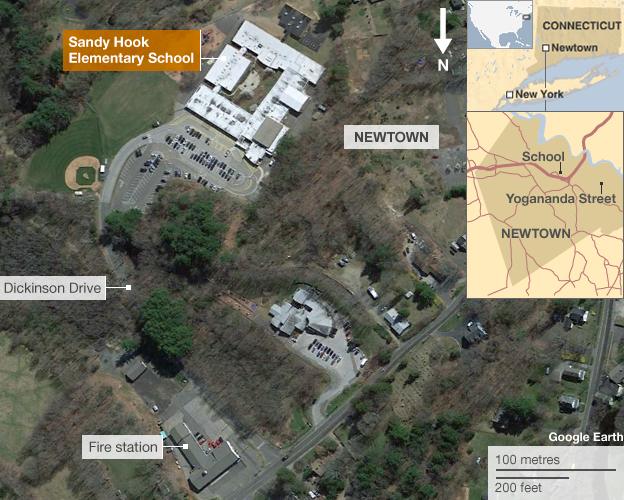
Even in a country where mass shootings are common, Sandy Hook stood out. The pupils were so young, and there were so many of them. Hundreds were traumatised - and many still are - after witnessing the carnage and its aftermath.
And yet despite extensive investigations, external and a report which determined that Lanza acted alone, conspiracy theorists have constructed a fake alternate reality in which the whole thing was an elaborate hoax, staged by the government to try to introduce strict gun control laws.
They seize on small inconsistencies between initial news reports from the chaotic scene and the facts. The more extreme among them have targeted the families of Sandy Hook victims. There have been at least two arrests linked to the hoax theories. On Wednesday, a warrant was issued for a Florida woman who is accused of harassing Lenny Pozner, external.
The sister of a Sandy Hook victim tells the BBC she is getting threats from conspiracy theorists
"We're a luckier family," says Hannah D'Avino, whose sister Rachel was a behavioural therapist at Sandy Hook Elementary School. "I personally will get about like three death threats a year because we don't speak up that much."
On a sunny, late winter's day in New England, Hannah sits in the stately Newtown Public Library, down the road from where her sister was murdered. She recalls her sister's spirit, her profound positive influence on her life, and her work with autistic children.
Her voice is subdued, but quivers with quiet determination.
"My sister was murdered 11 days before Christmas and I consider myself lucky because I don't have a stalker," she tells me. "That's the situation I'm in right now."
Some of the conspiracy theorists are regular visitors to this small hamlet in suburban Connecticut. In addition to the death threats and harassment directed at Lenny, Hannah and others, they've made videos of the school and local area and ask questions of locals and family members, and have posted the footage on YouTube.
And their theories have been picked up by one of America's most popular conspiracy theorists, a man who has been linked with President Donald Trump.
The online storm has prompted Lenny to form a volunteer network to track and take down the conspiracy theory videos and websites.
And other Sandy Hook residents are pleading with President Trump, asking him to speak out and help stop the madness.

Hear more
You can hear this story on BBC Trending on the BBC World Service or on The Sandy Hook Deniers on BBC Radio 4, Sunday 2 April at 13:30
And for more Trending stories, download our podcast

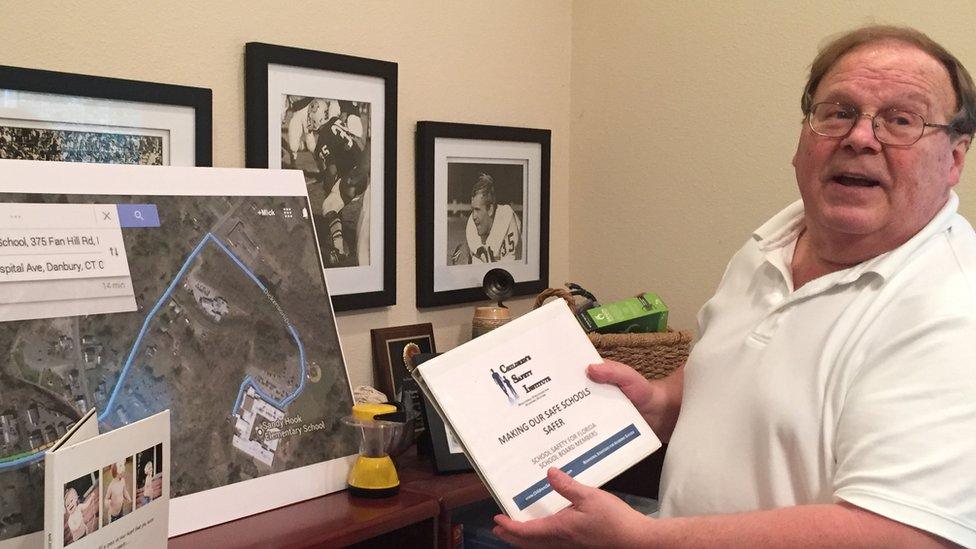
Wolfgang Halbig is one of the chief conspiracy theorists who denies the massacre happened
Wolfgang Halbig lives in a big yellow house in a sunny, lavishly landscaped gated community in Florida. He's a retired school administrator and safety advisor, and he says that when he first heard news of the Sandy Hook shootings, he was sitting in a chair in his living room, drinking coffee.
"My hairs stood up," he says. "Because they're not protected in the elementary schools."
Halbig donated money to the Sandy Hook families. But he soon became both obsessed with the tragedy - and, somehow, convinced that it never happened.
"I think 14 Dec 2012 is an event that was in planning for a long, long time," he tells me. "I think it probably took them two, two-and-a-half years to write the scripts for all the participants that were invited to participate in that exercise - or drill as I will call it."
Halbig has since devoted years of his life to "exposing" what he thinks is a government plot. He started a website. He's revealed personal information about the victims of his attacks, including names, addresses, legal documents and financial information. And he's personally travelled to Sandy Hook a number of times.
"I call it an illusion. The biggest government illusion that's ever been pulled off by [the US Department of] Homeland Security."
In his office, ghoulish blown-up pictures of the crime scene mingle with pictures of his family and his days as an American football player. His so-called evidence consists of a string of tiny details, small anomalies which are for the most part easily explained by the inchoate nature of a horrific breaking news event.
"I'll be honest with you," he says, "if I'm wrong, I need to be institutionalised."

More from BBC Trending
Visit the Trending Facebook page, external

Conspiracy theories are a perennial feature of American life. But now they can be picked up by extremists and spread virally through social media. And that process has been fuelled by America's deeply partisan political environment.
Hundreds of videos online are pushing false Sandy Hook narratives. Collectively, they have millions of views. Falsehoods are repeated by Twitter accounts and on Facebook.
Still, the theories might have stayed quarantined in some of the darker corners of the internet, were they not picked up and amplified by one of America's most popular conspiracy theorists.
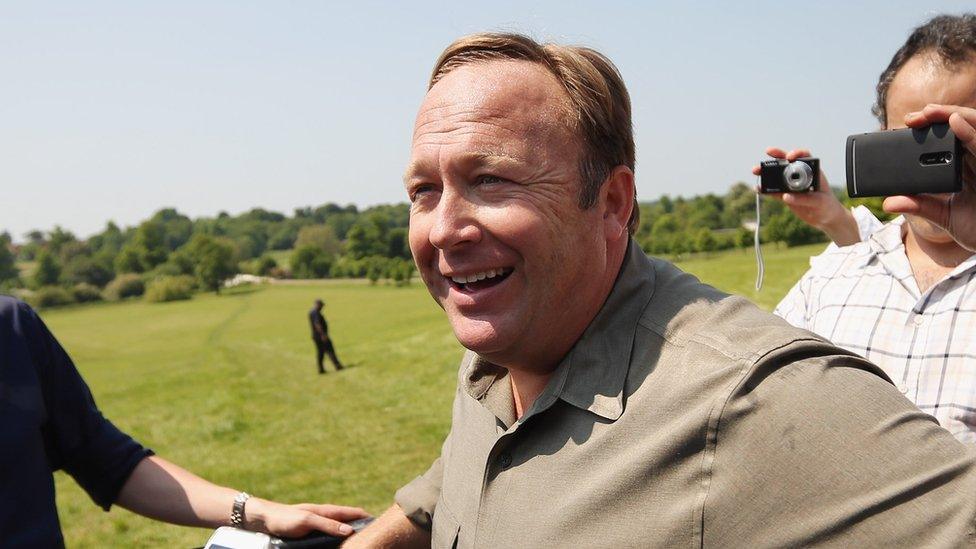
Alex Jones of Infowars
Alex Jones is a talk show host and the founder of the multimedia portal Infowars. Regular listeners and readers are used to his rants on everything from 9/11 to attacks across Europe. And on several broadcasts he embraced the Sandy Hook conspiracy theorists. Less than two years after the attacks, he welcomed Halbig on his programme and talked about an Infowars story headlined "FBI says no one killed at Sandy Hook, external".
"Internet sleuths immediately took to the web to stitch together clues indicating the shooting could be a carefully-scripted false flag event, similar to the 9/11 terror attacks, the central tenet being that the event would be used to galvanize future support for gun control legislation," the story stated.
He returned to the theme several months later on his radio show, external: "I've had the investigators on, the state police have gone public, you name it - the whole thing is a giant hoax. And the problem is, how do you deal with a total hoax? How do you even convince the public something's a total hoax?"
Later he said: "Sandy Hook is a synthetic, completely fake with actors, in my view, manufactured. I couldn't believe it at first. I knew they had actors there clearly but I thought they killed some real kids, and it just shows how bold they are, that they clearly used actors."
The liberal think tank Media Matters for America has listed other instances, external of Jones accusing the parents of murdered children being actors or casting doubt on the Sandy Hook investigation. Matt Gertz of Media Matters says that online and on air, Jones has an audience of about 8 million.
"It's kind of remarkable, but believing that Sandy Hook was a hoax is actually fairly small ball for an Alex Jones conspiracy," Gertz says. "He thinks that a set of global elites are planning to murder 80% of the world populace and enslave the rest of them. He has claimed that the federal government has a weather machine that they use to target tornado strikes on unfriendly populaces.
"He is sort of the nexus for what's really a distributed network of conspiracy theorists who are on Facebook or on Twitter or using sites like Reddit or 4Chan or 8Chan."
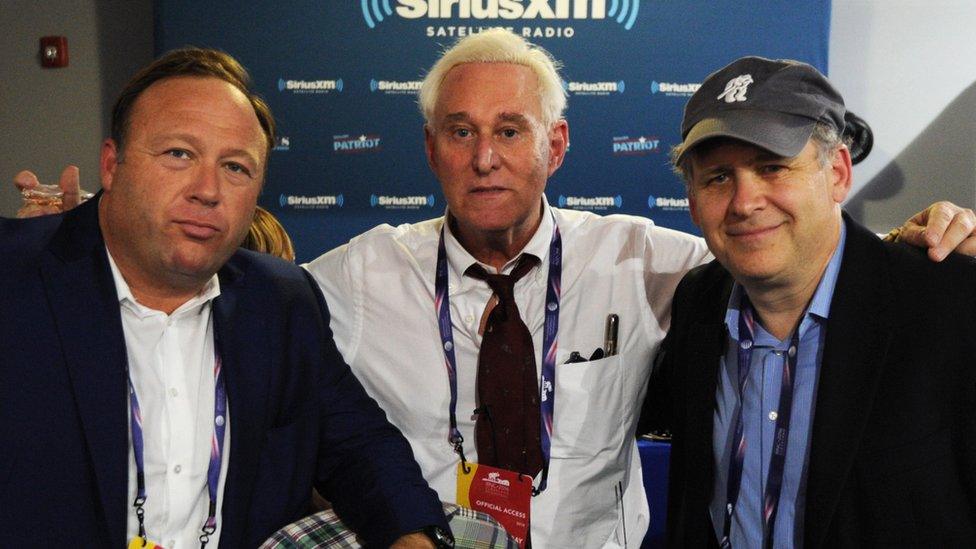
Jones (left) along with former Trump campaign advisor Roger Stone (centre) and journalist Jonathan Alter at the 2016 Republican National Convention in Cleveland, Ohio
Jones, who did not respond to repeated requests for an interview, has also been linked to President Trump. In late 2015, Trump appeared on Jones's radio programme. At the end of a half-hour interview, external, the candidate told the host: "I just want to finish by saying your reputation's amazing. I will not let you down, you will be very very impressed I hope.
"And I think we'll be speaking a lot... a year into office, you'll be saying 'Wow, I remember that interview, he said he was going to do it, and he did a great job.' You'll be very proud of our country."
Former Trump campaign advisor Roger Stone regularly appears on Jones's show, and reportedly was the person who introduced, external the presidential candidate and the talk show host.
Trump has retweeted Infowars reporters and stories (for example here, external and here, external) and stories of dubious provenance that first appeared on the site have regularly shown up in Trump speeches and tweets.
To take just one example: in November 2016, Trump tweeted, external: "In addition to winning the Electoral College in a landslide, I won the popular vote if you deduct the millions of people who voted illegally."
The message repeated an allegation with scant basis in fact - a story that had appeared on Infowars earlier that month, external.
Trump has not endorsed the Sandy Hook conspiracy theory, nor has he spoken about Jones's claims that the massacre was a hoax. The White House did not respond to a number of requests for comment, including a series of questions about the relationship between the president and Jones.
Jones himself has tried to make the most of his connections to Trump. He claims the president called him shortly after winning the election and has spoken to him since, although the the New York Times reported, external that a Trump aide, speaking on condition of anonymity, "played down the frequency of their contact".
"It is surreal to talk about issues here on air and then word-for-word hear Trump say it two days later," Jones said on his radio show in August 2016, external. "It is amazing."
Gertz, from Media Matters for America, says that there is evidence that Jones does talk with the president. But he cautions that both men have had a history of pushing conspiracy theories and presenting "alternative facts".
"So trying to nail down for sure what their relationship is, based on the statements that they say about each other, is pretty dicey," he says.
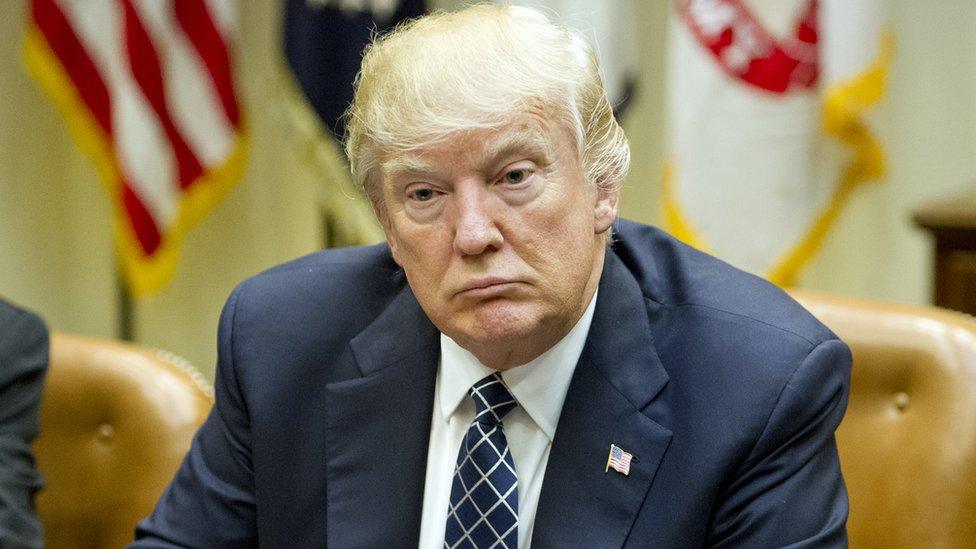
Less than two weeks after the 2016 presidential election, Jones posted a video, external which he declared was his "final statement" on Sandy Hook. In it, he claimed he had been unfairly treated by the media.
"I've always said I'm not sure what really happened, but there's a lot of anomalies and there has been a cover-up of what did happen there," he said.
"There is some evidence that people died there," he said. "I don't know what the truth is, all I know is the official story of Sandy Hook has more holes in it than Swiss cheese."
He then played a montage of news clips and material from his Sandy Hook programmes over the years, including footage of Wolfgang Halbig. He did not include his "Sandy Hook is a synthetic, completely fake with actors" quote. In signing off, he took another swipe at parents of murdered children who spoke to the media in the aftermath of the attacks.
"If children were lost in Sandy Hook, my heart goes out to each and every one of those parents and the people who say they're parents that I see on the news. The only problem is, I've seen a lot of soap operas, and I've seen actors before, and I know when I'm watching a movie and when I'm watching something real. Let's look into Sandy Hook."
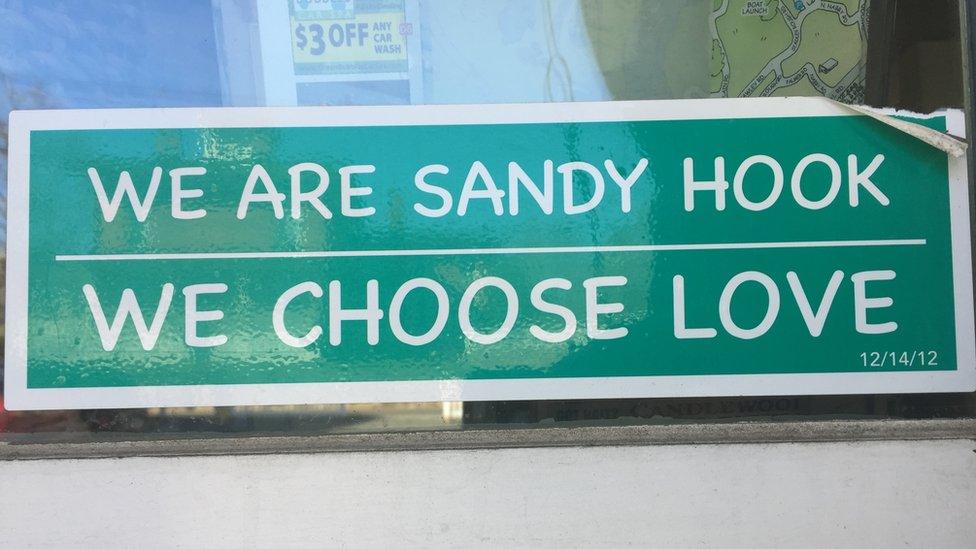
In front of his computer screen in his undisclosed location, Lenny Pozner is taking on the conspiracy theorists. He flicks through a YouTube page and points out a new video.
"Look - this was just posted," he says. "It's a hoaxer type video - it's insulting, it has images of people who were connected to the tragedy."
The thumbnail picture has a photo of his son Noah's headstone. There's text on the picture which reads: "empty grave". In the video, there's a picture of Lenny himself.
"Here's a photo of me taken two days after my child was killed and I'm being called a liar fraud and terrorist," he says. "That's how they vilify people."
Lenny used to be a casual Infowars listener - he liked to listen to conspiracy theories as entertainment. That's how he initially found out that his son's murder was being denied by the conspiracy theorists.
At first he tried to engage with them through a Facebook group. But soon the mood among the hard-core hoaxers hardened.
"The only people that would come into the groups were trolls," he says. "They were just coming in for their own amusement... after that I decided that the most important thing would be to start taking down content that's spreading this information," he says.
Every day, Lenny scrolls though reams of conspiracy minded content, complaining to social networks and attempting to get videos and posts taken down using network rules about copyright, decency and harassment. And he's created an organisation, the Honr Network, external, to help the fight against the hoaxers.
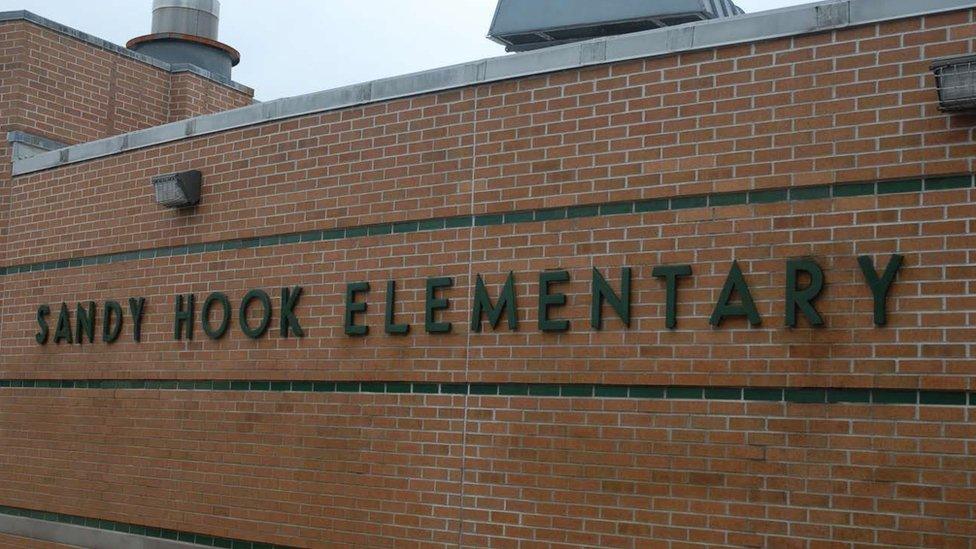
After four years of pain, compounded by the harassers and the conspiracy mongers, people in Sandy Hook are tired - and some of them are asking the president to step in.
I meet Eric Paradis, a local Democratic Party official, in a bar down the road from Sandy Hook. One of Paradis's daughters was at Sandy Hook Elementary on the day of the shooting - she survived.
Although Alex Jones has not been involved in the harassment of the families, Paradis says the president could use his influence to push Jones and the conspiracy theorists to the fringes, and help stop the harassment of Sandy Hook victims.
"The town committee wanted to put a letter together asking the president to denounce these hoaxers and tell them look… these are real children who died," he says.
His letter is still under consideration by local officials. It reads:
"[Jones] continues to spread hate and lies towards our town, towards the people and organizations who came to help us through those darkest days. Jones repeatedly tells his listeners and viewers that he has your ears and your respect. He brags about how you called him after your victory in November. Emboldened by your victory, he continues to hurt the memories of those lost, the ability of those left behind to heal."
The letter goes on to ask Trump to "intervene and stop Jones and others hoaxers like him". Paradis says he and other Democrats tried to avoid making the letter about Trump's larger political agenda.
"I really do think he can help us put a stop to it, because he does have a unique position with these hoaxers," he says. "If he can help us out then that's fantastic and a Democrat [like me] would be very grateful if he could."
Lenny Pozner continues to take action against the trolls. He's filed a lawsuit against Halbig, alleging invasion of privacy. Halbig is fighting the suit, which is just getting underway, and says that if he loses, he'll check himself into a mental institution.
Lenny turns back to his computer, where he spots more conspiracy theory videos. So will he ever stop trying to fight the hoaxers?
He takes a deep breath and a long pause.
"I don't know," he says. "I would like not to have to do this. I would like to just leave it alone and feel the memory of my child is sacred and other people are also treating it that way," he says, "but as long as they're not - I feel I need to defend that memory."
Blog by Mike Wendling, external
With reporting by Sam Judah
You can follow BBC Trending on Twitter @BBCtrending, external, and find us on Facebook, external. All our stories are at bbc.com/trending.
Read more from Trending: The disturbing YouTube videos that are tricking children
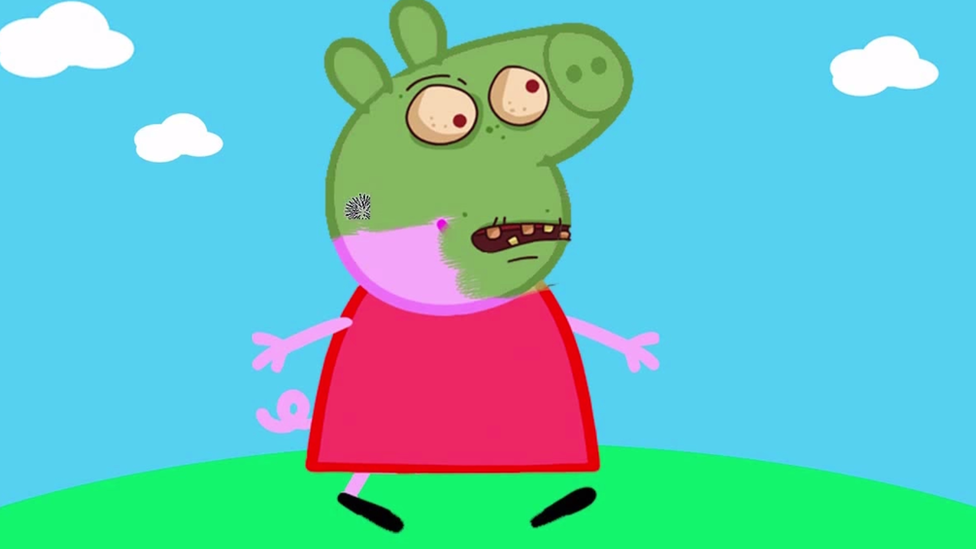
Thousands of videos on YouTube look like versions of popular cartoons but contain disturbing and inappropriate content not suitable for children. READ MORE
- Published18 December 2012
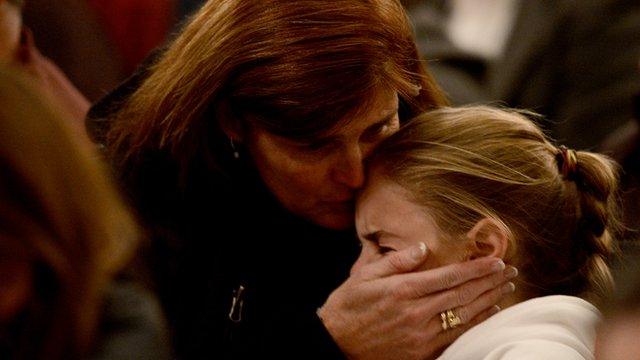
- Published18 December 2012
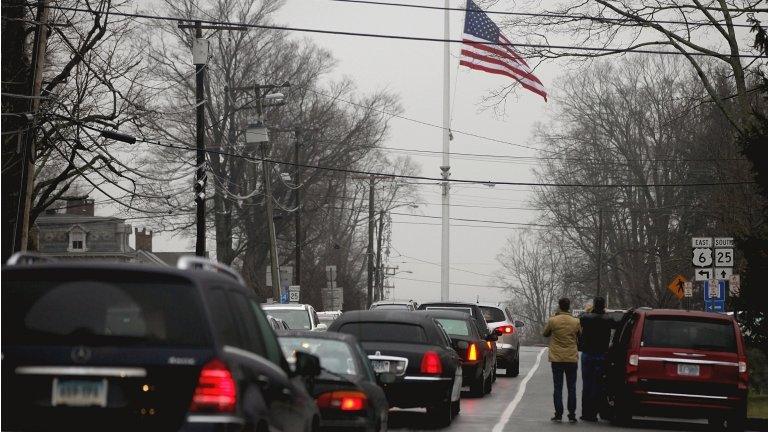
- Published4 February 2013
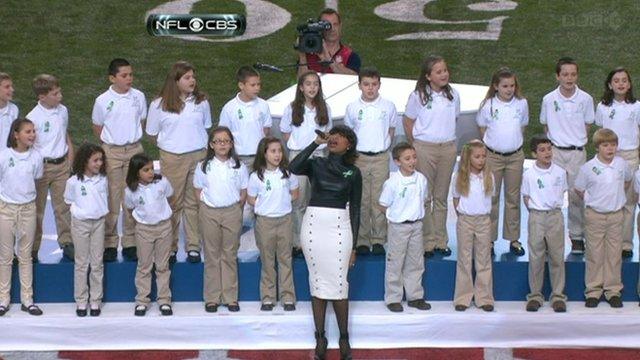
- Published8 December 2016
